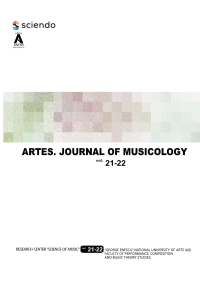Dostoevskian Literary Poliphony as Lyrical-Theatrical Hypostasis of Sergey Prokofiev’s Opera The Gambler
DOI:
https://doi.org/10.35218/Keywords:
Modernism, dialogism, declamation-manner opera, expressionist features, connection between literature-theatre-musicAbstract
Fyodor Dostoevsky’s perspective on humankind and society continues to intrigue any reader, whether specialized or from other areas of activity, due to the universality of the topics and the complexity of the characters involved. The novel entitled The Player depicts the life and specific concerns of 19th-century world society, a subject which attracted Sergey Prokofiev to compose a work with the same title, at the beginning of the 20th century. His opera is a unique work through the avant-garde musical language, the atypical construction of the discourse, the elements of style and conception of the libretto in relation to the original source. These elements generate a multiple correlation between the Dostoevskian prose, literary theory, the philosophy of language through studies and volumes of hermeneutic analysis, such as those signed by critic and semiotician Mikhail Bakhtin, on which we will focus our attention during this research. The terminology used by Bakhtin (dialogism, polyphony, ventrilogism, carnival) indicates a profound insight into the connection between Dostoevsky’s prose and the theatrical, dramatic, lyrical, musical aspects of the epic substratum in his novels. At the same time, Dostoevsky was an involuntary forerunner of the artistic movement initiated in Western Europe by German composers –Expressionism –, which also had echoes in the works of Russian composers from thefirst half of the last century, as we shall see in Sergey Prokofiev’s approach of The Gambler.
Downloads
Published
Issue
Section
License
Copyright (c) 2023 ARTES. JOURNAL OF MUSICOLOGY

This work is licensed under a Creative Commons Attribution-NonCommercial 4.0 International License.

